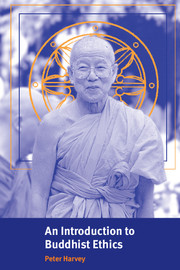Book contents
- Frontmatter
- Contents
- List of plates
- Acknowledgements
- List of abbreviations
- A note on language and pronunciation
- Introduction
- 11 THE SHARED FOUNDATIONS OF BUDDHIST ETHICS
- 12 KEY BUDDHIST VALUES
- 13 MAHĀYĀNA EMPHASES AND ADAPTATIONS
- 14 ATTITUDE TO AND TREATMENT OF THE NATURAL WORLD
- 15 ECONOMIC ETHICS
- 16 WAR AND PEACE
- 17 SUICIDE AND EUTHANASIA
- 18 ABORTION AND CONTRACEPTION
- 19 SEXUAL EQUALITY
- 10 HOMOSEXUALITY AND OTHER FORMS OF ‘QUEERNESS’
- Glossary and details of historical figures and texts
- List of references
- Useful addresses
- Index of Buddhist texts, schools cultural areas, movements and organizations
- Index of concepts
- Index of names
17 - SUICIDE AND EUTHANASIA
Published online by Cambridge University Press: 05 June 2012
- Frontmatter
- Contents
- List of plates
- Acknowledgements
- List of abbreviations
- A note on language and pronunciation
- Introduction
- 11 THE SHARED FOUNDATIONS OF BUDDHIST ETHICS
- 12 KEY BUDDHIST VALUES
- 13 MAHĀYĀNA EMPHASES AND ADAPTATIONS
- 14 ATTITUDE TO AND TREATMENT OF THE NATURAL WORLD
- 15 ECONOMIC ETHICS
- 16 WAR AND PEACE
- 17 SUICIDE AND EUTHANASIA
- 18 ABORTION AND CONTRACEPTION
- 19 SEXUAL EQUALITY
- 10 HOMOSEXUALITY AND OTHER FORMS OF ‘QUEERNESS’
- Glossary and details of historical figures and texts
- List of references
- Useful addresses
- Index of Buddhist texts, schools cultural areas, movements and organizations
- Index of concepts
- Index of names
Summary
Whatever monk … should praise the beauty of death … he is not in communion.
Vinaya-piṭaka 111.73CONSIDERATIONS AND ARGUMENTS AGAINST SUICIDE
While Buddhism emphasizes that there is much dukkha in life, this can, paradoxically, help dissuade a Buddhist from giving in to despair. If dukkha is to be expected in life, then there is less reason to take particular problems so personally: as the world conspiring against one. Reflection on the idea of phenomena as not-Self can also help a Buddhist to avoid being dragged down by unpleasant experiences. Reflection on the principle of impermanence should urge him or her to realize that all bad things come to an end, sooner or later. Reflection on the principle of karma should mean that he or she is more willing to live patiently through the results of his or her own prior action – and maybe learn something about the nature of life in the process – rather than sow the seeds of future suffering by new, rash actions.
Of course, someone faced with some weighty suffering might kill himself or herself in the hope of something less intolerable after death; yet there is no guarantee that matters may not be made worse by this act. From the Buddhist perspective, the next rebirth might be as an animal preyed on and eaten by others, as a frustrated ghost, or in a hell: so suicide may lead on to something more ‘intolerably painful’ than the present life.
- Type
- Chapter
- Information
- An Introduction to Buddhist EthicsFoundations, Values and Issues, pp. 286 - 310Publisher: Cambridge University PressPrint publication year: 2000



